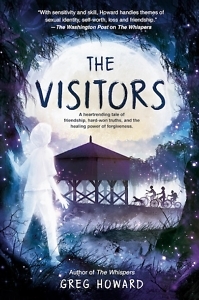Everything Here Is Dead
A lonely boy unravels the mystery of his own death
In the acknowledgments section of his most recent middle-grade novel, The Visitors, Greg Howard says that this was “the most challenging story” he’s written. It’s easy to see why. The novel includes sensitive themes (slavery, sexual orientation and identity, bullying, betrayal, abuse, suicide); the main character is unable to remember anything about his life; and the narrative fits into multiple genres: coming-of-age, mystery, the supernatural. There are numerous characters, each with a backstory, and multiple stories set in different times that twine together.

In less skillful hands, readers of The Visitors might have been left confused or traumatized. But Howard knows his readers and his subject matter, and he weaves a narrative that faces the disturbing material squarely but compassionately, and in a clear, age-appropriate manner.
The unnamed main character of The Visitors “lives” (readers will quickly figure out that he’s a ghost) in the long-abandoned and seriously creepy Hollow Pines Plantation, along with former residents of the place. Some of these spirits had been enslaved when alive, and each is the survivor — or in one case the perpetrator — of at least one traumatic experience on the property.
The boy’s references to an uncle in Vietnam, Walter Cronkite, and the Beatles tell us he has been dead about 50 years. What is unclear, though, is why he, along with the other ghosts, is “stuck” at the plantation. When he tries to walk off the property, he finds himself suddenly walking back in. What is keeping him trapped?
Then two boys and a girl show up. Hungry to be around people his own age, the narrator eavesdrops on them and discovers that they’re working on a story for a journalism class. The story is about the disappearance of a boy named Will Perkins, who had last been seen at the plantation 50 years earlier.
When he hears this name, the boy suddenly knows that he is implicated in the mystery about Will Perkins, that he’s somehow responsible for what happened to him, and that what happened to Will was something terrible.
Interwoven in the main narrative are short chapters set in the 1960s, showing Will Perkins navigating the first days of middle school, confident that his best friend, Ronnie, will help him find his way. But Ronnie, fresh from a summer spent at football camp, has revealed to his new friends that Will is gay, and from then on, school is a miserable and hostile place. Home — with a violent father and an absent mother — isn’t any better.
 Most readers will figure out fairly soon that the boy at Hollow Pines is Will, and that he died at the plantation. Several mysteries remain: How did Will die, and why has no one found his body? Why can’t he leave the plantation? Of all the people who lived there over the centuries, why do only a few of their ghosts remain? What unites them? What happened to Will’s older sister? And why is the terrifying ghost of Jackson Culpepper determined to harm Will’s new friends?
Most readers will figure out fairly soon that the boy at Hollow Pines is Will, and that he died at the plantation. Several mysteries remain: How did Will die, and why has no one found his body? Why can’t he leave the plantation? Of all the people who lived there over the centuries, why do only a few of their ghosts remain? What unites them? What happened to Will’s older sister? And why is the terrifying ghost of Jackson Culpepper determined to harm Will’s new friends?
Just as the formerly enslaved inhabitants of the plantation have a hard time comprehending or believing in the civil rights movement that Will has told them about, Will has difficulty wrapping his mind around the fact that the girl in the trio of visitors, although once considered a boy, is now freely accepted as a girl. He wonders how his own life would have turned out if he had lived in a different time.
After an action-packed showdown with the evil Culpepper, Will comes to terms with the past. He discovers why he and the other ghosts have been unable to leave the plantation, and his courage and resolve set them all — or almost all — free.
Howard doesn’t shy away from hard truths. Sometimes “friends” turn out to be jerks. Sometimes parents can’t handle parenting. Sometimes it looks as though things will never get better. Will recognizes that when he was alive he didn’t have the tools to handle the pain of his family life and best friend’s betrayal, but now he does and his spirit is liberated.
Despite the challenging subject matter, this is a hopeful and affirming book with a sympathetic, relatable main character. Atmospheric and yes, challenging, The Visitors is ultimately a story of hope and redemption.

Tracy Barrett is a writer who lives in Nashville. Her most recent book, Freefall Summer, was published by Charlesbridge Teen.


